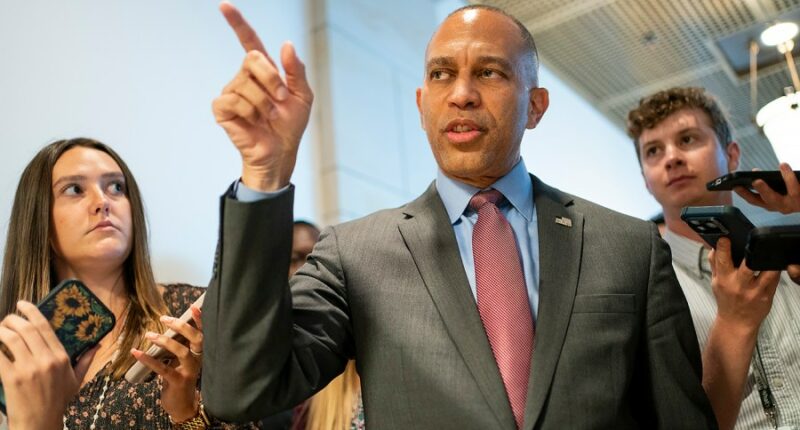Share this @internewscast.com

House Minority Leader Hakeem Jeffries (D-N.Y.) cautioned Republicans on Monday that they might regret their decision to revisit the events of the Jan. 6, 2021, U.S. Capitol attack.
Jeffries indicated that Democrats intend to leverage their involvement in the newly established GOP inquiry into the assault to emphasize President Trump’s role in instigating the violence on that day.
“Republicans will regret that they’ve decided to go down this road,” Jeffries told reporters in the Capitol.
Last week, Republicans voted to set up a new committee to investigate Jan. 6, nearly three years after the original select committee released a report attributing blame to Trump for inciting the riot. This new committee also has the authority to scrutinize the previous investigation.
Republican leaders have stood by Trump’s actions related to the attack, criticizing the original investigation as a biased effort designed solely to damage Trump politically. The new committee is likely to be used to attempt to clear their ally in the White House, who faced a second impeachment after the 2021 riot.
“Our objective is to resolve the unanswered questions, uncover all the details, and ensure reforms are in place to prevent such security breaches in the future,” announced Rep. Barry Loudermilk (R-Ga.), who will lead the committee, following its formation.
“It’s time to finish the job.”
Democrats claim they’ll use the current investigation to focus attention not only on Trump’s actions but also on the violence committed against police officers by his supporters, as well as the offenses carried out by some MAGA followers since Trump pardoned them in January.
Rep. Jamie Raskin (D-Md.), as the ranking member of the House Judiciary Committee, is automatically considered an ex officio member of the new panel. And Jeffries named three other Democrats to the committee on Monday: Reps. Eric Swalwell (Calif.), Jasmine Crockett (Texas) and Jared Moskowitz (Fla.).
“Donald Trump is trying to do with Jan. 6 what many fringe groups have done with Sept. 11, telling us it wasn’t planes that flew into the buildings but holograms, or missiles, or that it was an inside job,” Swalwell said Monday. “And here’s why we didn’t buy the 9/11 crazy talk then, or the Jan. 6 lies now: Because we saw them with our own eyes.”
Raskin, who was a member of the initial Jan. 6 committee, characterized a previous Loudermilk investigation as “an attempted Orwellian rewrite” of the events surrounding the attack. He challenged the Republicans to find any inaccuracies in the first select committee’s probe of the event.
“The fact of the matter is they have not laid a glove on a single fact that was presented in the report of the bipartisan select committee on Jan. 6. All of their bizarre counter-theories about antifa and about the FBI have been completely and thoroughly debunked. They have gotten nowhere, and yet they insist once again on returning to the scene of the crime,” he said.
“That gives us the chance to reeducate new generations of Americans about the dangers of political authoritarianism, and about the dangers of political and religious cults.”
While Jeffries has the power to name his Democratic picks for the new committee, Speaker Mike Johnson (R-La.) retains the power to veto any of those lawmakers as he deems appropriate. That was the case in 2021, when former Speaker Nancy Pelosi (D-Calif.) removed two of the initial Republican picks — Rep. Jim Jordan (R-Ohio) and former Rep. Jim Banks (R-Ind.) — for controversial statements and actions they made surrounding Jan. 6.
It’s unclear if the Speaker is ready to accept the four Democratic appointees. Jeffries said he has informed Johnson of his selections, but suggested there has been no response.
“We let him know our choices for this subcommittee, and there’s zero precedent for anyone from the other party determining who is going to sit on a subcommittee — if, in fact, they want to take that subcommittee seriously,” Jeffries said.
Johnson’s office did not respond Monday to a request for comment.











